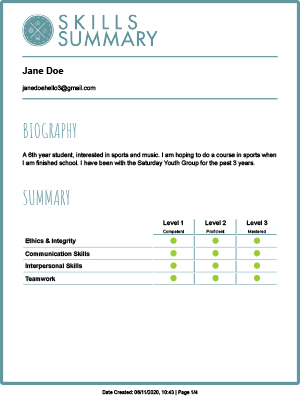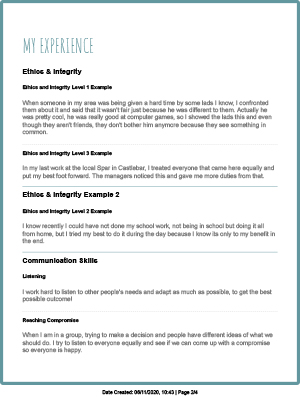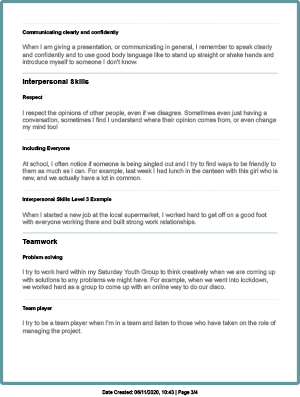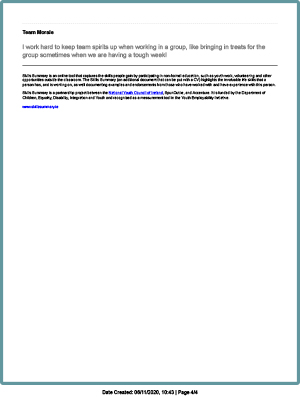Writing a great CV is important in today’s job market. Your CV is often the first impression you make on a potential employer. It can be hard to know what your CV should look like or what to include, particularly when applying for your first job. In this article, we’ll run you through some tips and guidance on how you can create a standout CV, no matter your experience.
What is a CV?
Here’s a fun fact: CV, short for curriculum vitae, literally means ‘course of life’ in Latin. We all know that a strong CV is key to securing the job you want. It is usually the first way a manager learns about you and can be how they decide whether they want to invite you to an interview. Therefore, it is important to emphasise your relevant ability. But don’t worry – it’s not as difficult as you would imagine. If you like you can use the CV template that we have created for you!
What does a CV look like?
Your CV gives basic information about you, your education, work experience, skills and achievements. This is to show the employer you are a suitable candidate for the job – it shows what makes you shine. Whereas your cover letter will explain why you would like the job and what makes you the right fit for it.
Here are two helpful tips:
- Write your CV in software that is easily openable, such as Microsoft Word, or save it as a PDF if you are emailing your CV.
- Save the file as yourfirstname_yourlastname (for example: Jane_Doe) so that it can be easily found.
What do I include in my CV?
- Start with your contact details and a short, formal biography about you.
- List any educational experience (as applicable).
- List an experience you may have. This doesn’t need to be paid or formal work, as long as it shows your skills and is relevant to the job. Your personal Skills Summary can help you with this.
- Make sure to include any skills, interests, hobbies and/or achievements.
- If possible, include a ‘referee’. This is someone who a possible employer can call. It is similar to someone endorsing you on your personal Skills Summary.
- Some things not to include in your CV and that you should not be asked to disclose are your marital status, your date of birth, your nationality/ethnicity (this can only be asked if you are legally allowed to work at the company), your religion, about any disability or health concerns you may have (this is your choice to share or not) and finally in Ireland it is not common practice to put a photo on your CV. There is more information on this page for the legal aspects of hiring staff.
How should my CV look?
- Use a simple-to-read plain font such as Times New Roman in 12 point and certainly no smaller than 10 point.
- Also, don’t just increase your font size to make up for blank space as this makes it more obvious! Blank spaces are okay, actually they give the reader’s eyes a break.
If you have work experience (including unpaid, volunteering, etc)
For past activities and jobs with a link to the role you are applying for, include more detail. These activities can include your unpaid experience – such as: computer knowledge like gaming which shows creativity, helping out on a farm can show manual skills, volunteering experience which can show improved interpersonal skills, or youth work you have been involved in that demonstrates teamwork skills.
Try to focus on the duties applicable to the job you are applying for and be specific, including any responsibilities you were given or goals you set for yourself (eg. completed a charity fundraiser 5km run for my local sports club). Outside-of-work activities could also include creative outlets you have. Show this information on your personal Skills Summary. If you include work experience, here are some tips:
- Above everything, be honest. You don’t want to get caught out and be stuck in a negative cycle. Being honest is an important quality – above all, your skills are there, and your personality will shine through. Everyone starts off with no experience!
- Use positive language. Action words like ‘excellent’, ‘competent’, ‘experience in’, ‘creative use of’ and ‘able’ can brighten up a sentence. For example: from a volunteering role where you worked with groups, you could say: ‘Gained valuable experience working with various age groups, able to work well in groups. Excellent interpersonal skills.’ Sometimes it’s just about selling what seems small!
- Keep it short, there is no need to include unnecessary information. You can expand on this information in an interview anyway.
- Try to avoid using the words ‘I’, ‘my’ or ‘me’. The language should be more general as if somebody else wrote it about you.
What if I don’t have much/any experience working?
Don’t worry! Even if you haven’t had a paid job before or much experience working, you have experience and skills from life that you can emphasise. It isn’t only paid work that counts. It could be volunteering, projects in school, university, your community, being involved in a local sports team, another team activity or even a hobby. These things can show creativity, demonstrate initiative and can show your suitability for a role in another way.
What can I include in terms of my skills, achievements, hobbies, etc?
You can include any sort of skills, achievements, hobbies and interests you feel are important to you and would look good on your CV – or none! Here we break it down into three categories, and there is more help on this in the Skills Summary CV template:
- Skills: Name the skill and include examples. They can come from anywhere (eg. writing or communication skills developed through blogging) and you can also list specific computer programmes or software you are familiar with here if applicable, such as till systems. You can use examples from your personal Skills Summary for this or include your Skills Summary after your CV to show this information.
- Achievements: An achievement can be anything you’ve done successfully – a task, a presentation, a course, even fundraising or an award. Name the achievement (it doesn’t need to have a title – you can give it one) and explain it briefly. For example, captain of my hurling or camogie team.
- Interests and hobbies: This section can give an insight into you as a person for a prospective employer which is helpful if you have less work experience. You could include things like gaming, sports, art, outdoor activities, music and other interests here by listing them. There is no need to just list off examples, a maximum of three is usually sufficient.
What is a referee, and do I need to include one?
A referee is simply someone who will talk to a possible future employer over the phone positively about you and why you are suited to a job. It can be a teacher, a youth worker, a mentor, someone you gained work experience from – anyone! Have you already asked someone to endorse you through Skills Summary? If so, they are the right people to ask for a reference!
Often, it is not necessary to include a referee on your CV. If they don’t ask for one, you can write ‘references available on request’ on your CV (see the Skills Summary CV template). As an alternative, you could ask someone to write you a reference (basically a letter written by a referee that you can reuse) speaking positively of you which you could give to possible future employers if they request one. Endorsements on your personal Skills Summary can also be used as a substitute for a referee, so remember to print out your full Skills Summary and give it in alongside your CV when applying for jobs!
What should I check for when finalising my CV?
- Your CV should be two pages maximum (front and back of an A4 sheet).
- Make sure your spelling and grammar are correct. You could use the Microsoft Word spell checker. Then ask someone you know to check it over for you. A high-quality CV can bring you much closer to getting an interview.
- Remember the language you use should be professional. To get an idea of what this looks like, read over your personal Skills Summary and the language used in the tool.
- Keep the format plain and clear (and consistent) so it is easy to read.
- Double check your contact details are correct.
- Before you put someone down as a referee, ask them if you can.
- Check everything you have written is truthful and accurate.
- If you have more experience than will fit on two pages, tailor it down to the information most relevant to the job you are applying for.
- Ensure detail is included for relevant experience/skills.
When finalising your CV consider your online presence
We live in a world that is increasingly taking place online and that means we can find out quite a bit about someone just by doing an internet or social media search with their name – and so can a company. Before you apply for a job make sure you have nothing publicly available that will present you negatively and, where possible, it is often a good idea to make your social media profiles private.
Can I email my CV, or do I have to bring it in in person?
It depends. For retail jobs, summer jobs and the like, there is a lot to be said for handing in your CV in person, whereas office jobs will often mean applying through an online form or by email. If an employer states applications are online, stick to what they ask you for as it is their preference and you want to keep them happy. Handing in your CV in person means you can introduce yourself face to face and show them your great personality. It shows them your interest in the role. You don’t need to dress as formally as you would for an interview, just make sure your clothes are neat and presentable.
For more on writing your CV, Spunout.ie has a guide and a further page on putting skills on your CV. For more information on disclosure, AHEAD has published A Guide To Disclosure.
What if I want to work abroad?
- Deciding to work abroad can be challenging, but also comes with big rewards, giving you new experiences and opportunities. Furthermore, factors such as the cost and language barrier may help you narrow your choice. Although it is not for everyone, here are a few tips if you are considering working abroad: Linkedin’s job search tool is helpful if you are looking abroad as it can be filtered to specific locations so you can browse opportunities in specific places when you are getting started. You can also sign up for email notifications when there are new opportunities matching your saved searches.
- Adapt your CV to the country you are applying to. For example, in some countries, employers expect a photograph of you to be attached to your CV. This is very unusual in Ireland. Also consider if you need to change any language on your CV. A quick google search for ‘CV template [country]’, listing the country you are interested in working in, should give you an idea of any big differences you might need to be aware of. This webpage from the European Union may be helpful as you do this.
- Consider the costs of moving abroad – remember working abroad will most likely involve some sort of visa process (which you have to pay for) as well as flights and other costs. There are lots of online blogs where people have detailed these costs they encountered to get an idea – or, even better, talk to someone you know who has worked abroad if possible.
- For those interested in working elsewhere in Europe, if you are an EU citizen you can luckily move freely between EU member states. This takes a lot of the difficulty of moving abroad away, but is one people often forget! The Europass website is a great resource to help you to find a job in Europe.
What about my Skills Summary?
Your personal Skills Summary gives you an overview of your completed skills courses, examples and endorsements. You can use this document to supplement your CV and track your progress. It outlines your career skills, with personal examples and endorsements, in a clear manner for future employers. You can read more on these career skills in the Life Skills section or get tips and ideas on how to improve your career skills with our Take Action Tips.
Why not include your personal Skills Summary (see example below) with your CV when sending it to future employers? This is a great way to highlight your ability in a clear way and gives you a way to stand out from other applicants. If nothing else, that can’t be a bad thing!
An example of the full personal Skills Summary
More information on developing your Skills Summary can be found in our resources. Also, don’t forget to explore the Take Action Tips for simple ways you can practise and improve your life skills as part of your Skills Summary journey.



